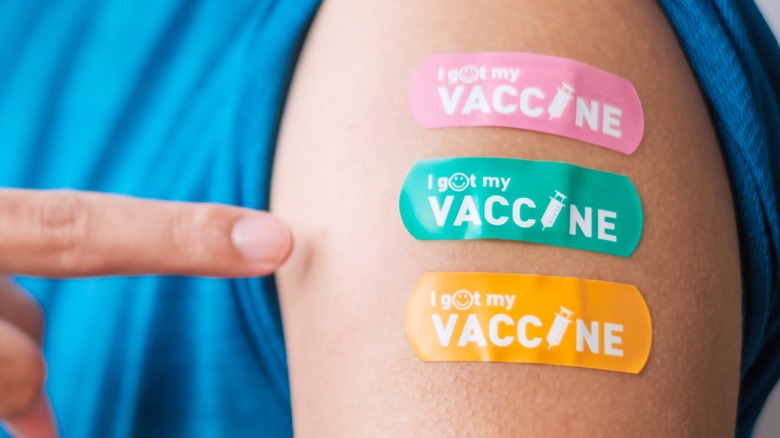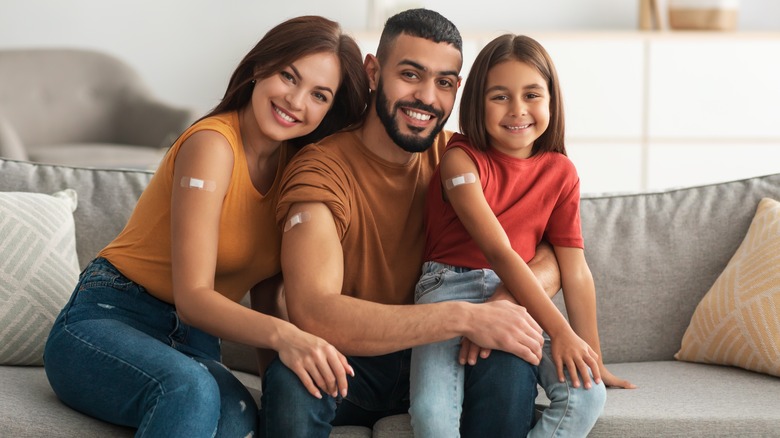Why You May Want To Mix And Match Your COVID-19 Booster, According To Doctors
With COVID-19 vaccinations ramping up to a fourth dose (i.e., second booster), keeping track of what formula to get might start to get a bit tiresome. There are a lot of different guidelines from both the CDC and the FDA, and whether you've gotten the Johnson & Johnson, Moderna, or Pfizer vaccines will make a difference.
It won't help with your initial vaccination, but when it comes to follow-up boosters, you may not need to stick to a specific brand. In fact, there's evidence to suggest that receiving a booster from the company you didn't get your initial vaccination from could be beneficial. The biggest benefit seems to come from getting either a Moderna or Pfizer booster after receiving the Johnson & Johnson single-dose vaccine, though mixing boosters between Modern and Pfizer is also acknowledged.
Back in October of 2021, the FDA expanded the recommended authorizations for COVID-19 boosters to include "...the use of each of the available COVID-19 vaccines as a heterologous (or 'mix and match') booster dose in eligible individuals following completion of primary vaccination with a different available COVID-19 vaccine." A study published in The New England Journal of Medicine in March 2022 examined the results of mixing and matching boosters and came to a similar conclusion, explaining that "Homologous boosting provided a wide range of immunogenicity responses, and heterologous boosting provided similar or higher levels."
What's available now
The three primary options for COVID-19 vaccination in the U.S. right now are Moderna, Pfizer, and Johnson & Johnson. Both Moderna and Pfizer are two-dose mRNA vaccines, which is a technology that's been around for decades and uses lab-developed mRNA to teach cells how to create a protein that will activate the necessary immune response to fight the virus. Think of it like that training montage we often see in movies, where the hero teaches a town how to defend itself from bandits.
Johnson & Johnson's vaccine is also available as either a substitute for people who can't or don't want to take mRNA vaccines and is the more typical kind of formula. It requires a single dose (as opposed to Moderna and Pfizer's two), and instead of using mRNA blueprints for defense, it uses a weakened or inactive germ to help your body learn how to fight it. Regardless of the version of vaccine you get, the CDC states that your vaccination isn't "complete" until two weeks after your final dose.
Of the three options and two types of vaccine, the CDC recommends Moderna or Pfizer's mRNA versions over Johnson & Johnson's more typical vaccine. All three companies have two additional boosters available, as well.
The benefits of mixing and matching boosters
To be abundantly clear, mixing and matching is not recommended for your initial vaccination — if you're starting your first round of any COVID-19 vaccine that requires a second dose, make sure that the second dose is from the same source. It's the follow-up boosters that the CDC says are safe to get interchangeably. Probably the simplest benefit is that, by not having to find a specific brand of COVID-19 booster, you have more freedom in setting up an appointment. You don't have to find a location that definitely has Moderna or Pfizer; you can just find a spot that offers boosters and set up an appointment that best suits your schedule.
In a statement to the U.K.-based health website Patient, Texas State University professor of clinical laboratory science and infectious disease specialist Rodney E. Rohde said, "Research and global real-time data have shown mixing and matching as an approach for COVID-19 vaccination is safe. In some cases, it can even be more effective than not mixing. It can show a very strong 'boost' effect."
The main reason to mix up your booster doses is if you've received the Johnson & Johnson vaccine. A CDC report from April 2022 documents a greatly reduced number of emergency room visits in patients with the J&J vaccine and an mRNA booster compared to those with the J&J vaccine and a J&J booster. This improved defense also appears to work with mixing and matching Moderna and Pfizer boosters, but the effect isn't as pronounced as it is with the J&J vaccine.


